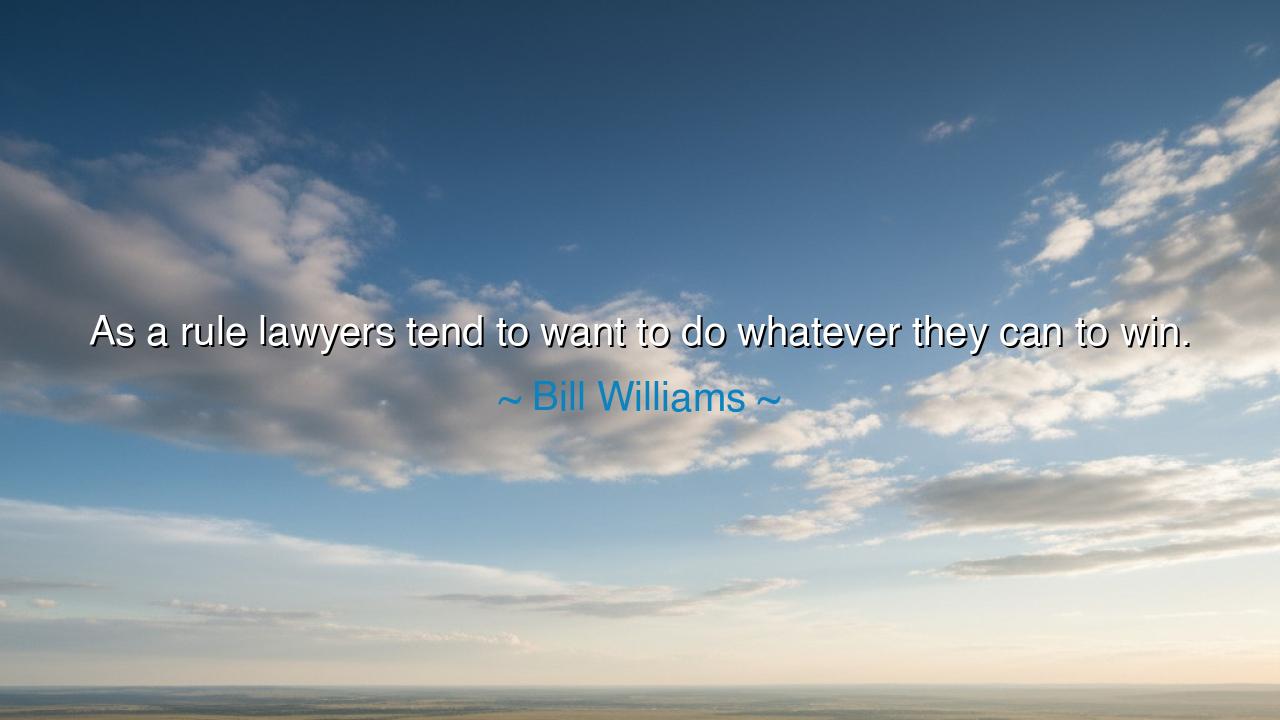
As a rule lawyers tend to want to do whatever they can to win.






Hear, O seeker of truth, the piercing observation of Bill Williams: “As a rule lawyers tend to want to do whatever they can to win.” At first, these words appear to describe only the habits of a profession, but in truth, they reveal a broader lesson about human ambition, the thirst for victory, and the peril of forgetting that the highest purpose of the law is not triumph, but justice. For in every courtroom, in every dispute, there is a battle between two forces: the desire to prevail, and the duty to uphold what is right.
The meaning of this teaching lies in the nature of the lawyer’s calling. A lawyer stands as the defender of another, the voice of the accused, the shield of the weak—or sometimes, the weapon of the strong. In this role, the temptation is great to see the trial not as a search for truth, but as a contest of wills. To “win” becomes the goal, and in that pursuit, some will twist words, conceal truths, or wield power in ways that serve not justice, but only their client’s cause. Williams, with quiet frankness, reminds us of this tendency: that the rules of the contest often overshadow the higher call of righteousness.
History gives us many examples of this duality. Consider the trial of Joan of Arc. Arrayed against her were lawyers, clerics, and officials, who sought not truth but condemnation. They bent the proceedings to ensure victory for their cause, ignoring the purity of her testimony and the justice of her mission. They “won” their case, sending her to the stake—but history itself condemned their victory as hollow and corrupt. Here we see the peril of law divorced from justice, and of advocates who cared more for triumph than for truth.
And yet, there are brighter tales. Recall Abraham Lincoln, himself once a lawyer on the prairies of Illinois. Though skilled in the art of argument, he was known for turning clients away when he believed their cause unjust. He did not see victory as worth the price of dishonor. Later, as president, he carried this same spirit into the greatest trial of the nation—the Civil War—seeking not only to “win,” but to restore union and deliver freedom to the enslaved. In him we see what is possible when the lawyer’s art is tempered with the fire of conscience.
Mark this well, O listener: the hunger to win is not in itself evil. Indeed, without it, no case could be fought with passion, no defense raised with vigor. But when winning becomes the only goal, it corrodes the very foundation of law. For law without justice is but clever rhetoric; victory without righteousness is defeat in disguise. The wise lawyer, and the wise man in any pursuit, must balance zeal with integrity, ambition with truth.
Let this be the lesson: in your own struggles, do not live only to win. Strive rather to be right, to be fair, to be honorable. Whether in disputes great or small, let your words serve not just your pride, but the deeper truth. And if you stand as an advocate for another, remember that you do not only represent a client—you represent the spirit of justice itself.
Therefore, O child of tomorrow, carry this wisdom as both shield and compass. Seek victory, yes, but seek it rightly. Do not trade integrity for triumph, nor truth for gain. For the victories of dishonor fade like smoke, but the victories of justice endure like stone. And remember always Williams’s warning: the temptation of the lawyer is to do whatever it takes to win—but the calling of the just is to do whatever it takes to uphold the truth.






AAdministratorAdministrator
Welcome, honored guests. Please leave a comment, we will respond soon